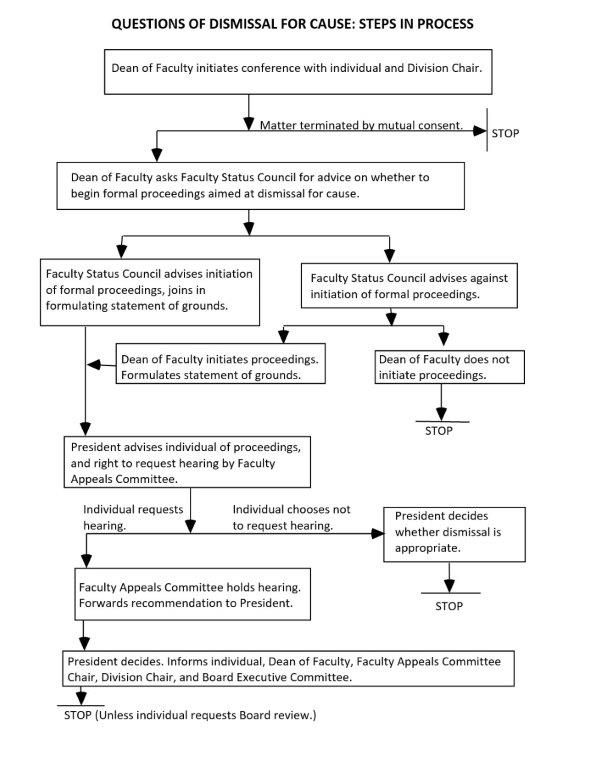Professional Competence and Dismissal for Cause
The professional performance of the faculty is the foundation of the College’s quality, and extensive efforts are made to sustain that performance on the highest possible level. Recognizing, however, that a situation could arise in which an individual’s competence or effectiveness might be called into question, the College has developed policies and procedures for dealing with such matters. The College is bound only by its policies and procedures, not by the policy statements of any external organization.
Maintaining high standards of professional performance throughout the faculty is an important responsibility of the faculty as a whole. In meeting that responsibility, individual faculty members may find it necessary in rare instances to raise the question of a colleague’s competence and effectiveness. Such a concern should be expressed to the colleague’s Division Chair, or to the Dean of Faculty. Either of those individuals, or the President, may also initiate such a question.
The following are considered adequate cause for dismissal of tenured faculty, or of faculty under term appointment before the appointment expires:
- Demonstrated incompetence or dishonesty in teaching or research.
- Substantial, persistent and demonstrated neglect of professional responsibilities or failure to observe the terms of appointment to the faculty.
- Personal conduct which demonstrably hinders fulfillment of professional responsibilities.
- Infirmities serious enough to qualify for total disability payments under the College’s disability plan and/or social security.
Once the question of competence or effectiveness has arisen, the Division Chair, the Dean of Faculty, and the faculty member shall discuss the matter in a personal conference. At this point the matter may be terminated by mutual consent. If the matter is not terminated, the Dean of Faculty shall present it to the Faculty Status Council and seek the advice of the members about the initiation of formal proceedings. If the Council recommends that such proceedings be begun, the members shall join with the Dean of Faculty in formulating a statement specifying with reasonable particularity the grounds proposed for dismissal.
If the Council advises against such proceedings, the members may suggest other possibilities for resolving the matter. After considering such advice and suggestions, the Dean of Faculty may still conclude that formal proceedings should be begun. If the Dean of Faculty goes forward in the absence of Council support, the Dean alone shall formulate the statement of the grounds for dismissal.
Formal proceedings commence with a letter from the President to the faculty member. The letter shall inform the faculty member that proceedings have been initiated on the grounds specified in the statement, and that, if the faculty member requests, a hearing on the charges shall be conducted by the Faculty Appeals Committee. The letter shall also call the faculty member’s attention to the procedures to be followed in such a hearing, as outlined in this document.
Within five class days of receiving the President’s letter, the faculty member shall respond in writing, stating whether a hearing is desired. If no hearing be requested, the President shall then decide whether the faculty member should be dismissed. If the faculty member does request a hearing, the Faculty Appeals Committee shall move quickly to set a time and place, and inform the individual and the Dean of Faculty accordingly. The hearing shall be scheduled to allow the faculty member at least fifteen class days, from the day of notification of the hearing date to the date itself, to prepare a defense.
The hearing shall be conducted in accordance with the procedures outlined in Appendix B. In such a hearing the burden of proof rests with those who contend that dismissal is justified.
Within fifteen class days of the conclusion of the hearing, the Faculty Appeals Committee shall report its findings and recommendations to the President in writing. The Committee’s report shall address directly and explicitly each of the grounds specified in the statement against the faculty member. The President shall then make a decision, informing the faculty member of the disposition of the case. The Dean of Faculty, the Faculty Appeals Committee chairperson, and the Division Chair shall be informed as well.
The President shall also inform the Executive Committee of the Board of Trustees of the decision. That decision is final, unless the faculty member asks that the Executive Committee review the case. Such a request must be made within ten class days of receipt of notification from the President. Beyond the Executive Committee of the Board, there is no further institutional recourse.
Any public announcement about the decision shall be issued by the President. Members of the Faculty Appeals Committee and other persons involved in the hearing shall maintain confidentiality and refrain from public comment. During the proceedings the faculty member shall be suspended only if continuance threatens immediate danger to persons or property. Unless legal considerations forbid, such suspension shall be with pay.
Steps to be followed when a faculty member’s competence or effectiveness is questioned are below.
